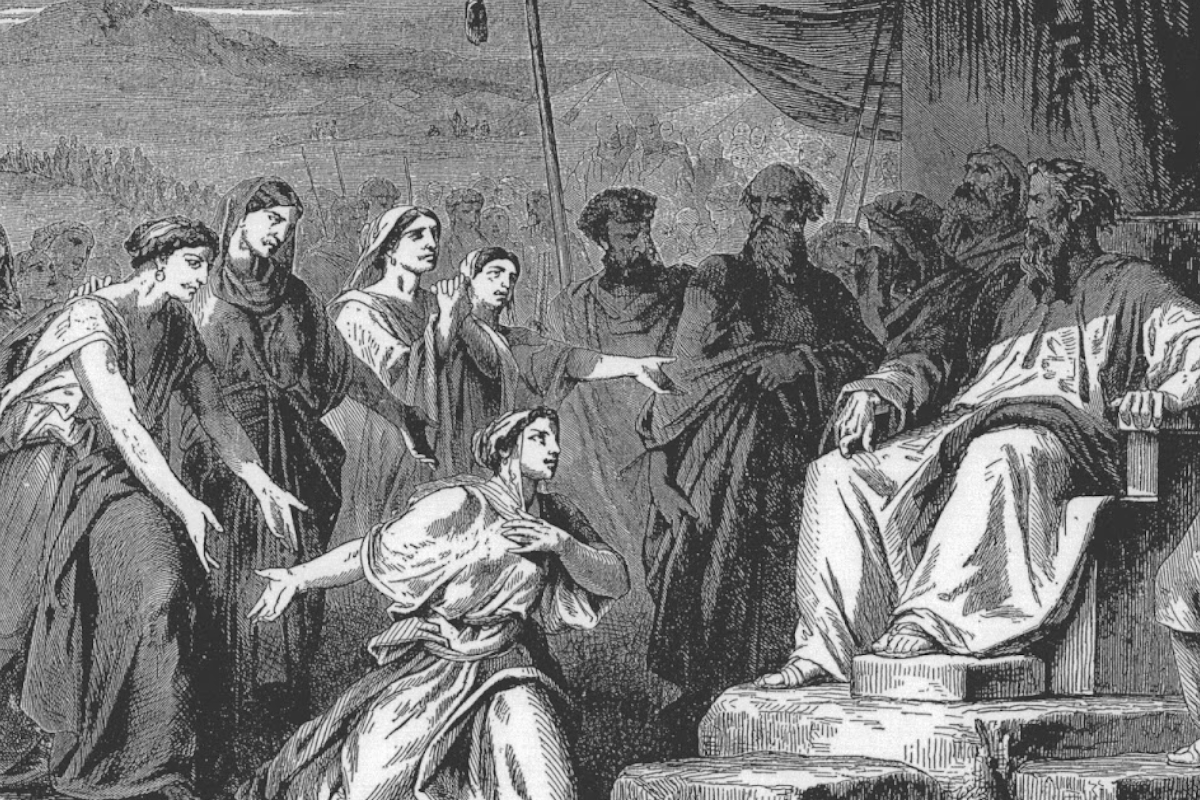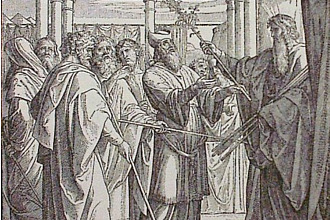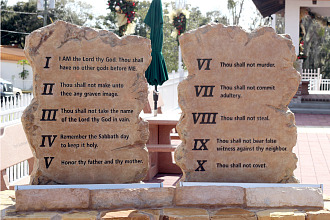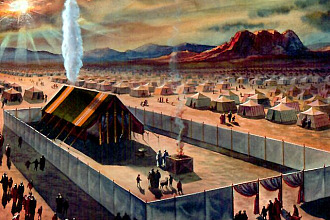Parasha for the Week: Matot/Masei Numbers 30: 2 - 36:13.
Aftarah for the Week: Jeremiah 1:1 - 3:4.
Besorat Yeshua: Mark 6:14 - 27.
Overview
Matot
Moshe teaches the rules and restrictions governing oaths and vows especially, the role of a husband or father in either upholding or annulling a vow.
Bnei Yisrael wages war against Midian. They kill the five Midianite kings, all the males and Bilaam. Moshe is upset that women were taken captive. They were catalysts for the immoral behavior of the Jewish people. He rebukes the officers. The spoils of war are counted and apportioned. The commanding officers report to Moshe that there was not one casualty among Bnei Yisrael.
They bring an offering that is taken by Moshe and Eleazar and placed in the Ohel Moed (Tent of Meeting).
The tribes of Gad and Reuven, who own large quantities of livestock petition Moshe to allow them to remain east of the Jordan and not enter the Land of Israel. They explain that the land east of the Jordan is quite suitable grazing land for their livestock.
Moshe’s initial response is that this request will discourage the rest of Bnei Yisrael, and that it is akin to the sin of the spies. They assure Moshe that they will first help conquer Israel, and only then will they go back to their homes on the eastern side of the Jordan River. Moshe grants their request on condition that they uphold their part of the deal.
Masei
The Torah names all forty-two encampments of Bnei Yisrael on their forty-year journey from the Exodus until the crossing of the Jordan River into Eretz Yisrael.
G-d commands Bnei Yisrael to drive out the Canaanites from Eretz Yisrael and to demolish every vestige of their idolatry.
Bnei Yisrael are warned that if they fail to rid the land of the Canaanites completely, those who remain will be "pins in their eyes and thorns in their sides."
The boundaries of the Land of Israel are defined, and the tribes are commanded to set aside forty-eight cities for the Levites, who do not receive a regular portion in the division of the Land.
Cities of refuge are to be established: Someone who murders unintentionally may flee there.
The daughters of Zelophehad marry members of their tribe so that their inheritance will stay in their own tribe.
Thus ends the Book of Bamidbar (Numbers).
"Gratitude"
The Almighty commands Moshe to avenge the Children of Israel for the crimes that the Midianites committed (enticing the men into illicit relationships and idol worship). Yet, the Torah tells us that: "Moshe sent forth a thousand from each tribe to the army ... and they massed against the Midian..." (Numbers 31:5-7).
Why did Moshe delegate the task to others and not go himself? The Midrash explains that Moshe had lived amongst the Midianites from the time he fled Egypt (after killing an Egyptian who was oppressing a Jew) until he returned to Egypt following God's appearance in the Burning Bush. Though the Midianites did not go out of their way to help Moshe, he felt a sense of gratitude. Therefore, he did not join his army in battle out of gratitude. If Moshe was grateful even to an unintended benefactor, all the more so must we be grateful to someone who has gone out of his or her way to help us - like our spouse!
"Anger"
The Torah states: "And Moshe was angry with the officers of the army, the captains of thousands, and captains of hundreds who came from the service of war." (Numbers 31:14) The Talmud (Pesachim 66b) informs us that Moshe was punished for his anger at the officers for not following his instructions regarding the Midianite captives. Basing itself on this verse, the Talmud says that if a wise person becomes angry, he will forget his knowledge. In his anger, Moshe forgot the laws dealing with the Midianite vessels. Consequently, Eleazar, instead of Moshe, taught these laws to the soldiers (verse 21).
Rabbi Simcha Zissel Ziv pointed out that Moshe's rebuke was correct. The soldiers had erred and deserved censure. Moshe's only wrong was his emotion of anger. Even when a person should rebuke someone, he must remain calm and be careful not to grow angry.
"Swearing"
We must especially be very careful to avoid using the expression "I swear." Swearing, even when one is 100% sure about the accuracy of the subject, is not proper. How much more so when people use the expression without thinking about whether the statement they are "swearing to" is true.
The Midrash relates the following which teaches us how careful one should be. "King Yannai ruled over two thousand cities. Yet they were all destroyed because they were accustomed to swearing —even in truth!"
"How so? A person would say to his friend, 'I swear that I will go and eat this and this in such a place; I swear that I will drink this and this in that place.' Then they performed exactly as they swore. They were still punished although they didn't swear falsely."
The Midrash concludes: If for those who swore the truth, the punishment was so severe; how much more so does one have to be careful not to swear falsely.
"Above all, my brothers, do not swear — not by heaven or by earth or by anything else. Let your "Yes" be yes, and your "No," no, or you will be condemned." Yaacov 5:12
HAFTARA: Jeremiah 1:1 - 3:4
Parasha: When Moses was called by G-d he was extremely reluctant saying that he was nobody. "Moses said to God, "Who am I that I should go to Pharaoh..." (Exodus 3:11)
Haftara: When Jeremiah was called he too was reluctant to accept. "Ah, Sovereign LORD," I said, "I do not know how to speak; I am only a child." (Jeremiah 1:6)
Parasha: "When a man makes a vow to the LORD or takes an oath to obligate himself by a pledge, he must not break his word but must do everything he said." (Numbers 30:2)
Haftara: Jeremiah is called by G-d to be a prophet in Israel. He knows G-d's law, he knows that we must not make a promise or a vow and not keep them.
Parasha: The people of God are in the desert living a sort of honeymoon with G-d.
Haftara: Jeremiah reminds Israel of the time of their first love in the desert.
Besorat Yeshua Mark 6:14-27
Parasha: The Israelites went to war against the Midianites who provoked Israel to sin, but they did not kill the women who were the first to push Israel to sin. "Have you allowed all the women to live?" he asked them. "They were the ones who followed Balaam's advice and were the means of turning the Israelites away from the LORD in what happened at Peor, so that a plague struck the LORD's people." (Numbers 31:15-16).
Besora: John the Immerser (Yochanan hamatbil in Hebrew) was the precursor of Yeshua. He denounced clearly the sin of Herod's family. A seductive women asked Herod to kill him. "When the daughter of Herodias came in and danced, she pleased Herod and his dinner guests. The king said to the girl, "Ask me for anything you want, and I'll give it to you." she answered. "I want you to give me right now the head of John the Immerser on a platter" Mark 6:22-25.












